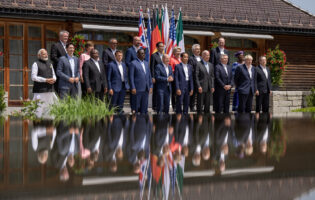German Foreign Policy and the Jewish Community
On March 3, 2011, AGI was pleased to host a seminar with Prof. Dr. Michael Brenner, DAAD/AGI fellow, on German Foreign Policy and the Jewish Community, which was generously supported by the German Academic Exchange Service (DAAD).
Prof. Dr. Brenner began his talk with historical background information surrounding the topic. In July 1949, just as the Federal Republic of Germany was established, a conference took place in Heidelberg, at which American military leaders and representatives of Jewish organizations assessed fundamental questions of the perspectives, future, and organization of Jewish life in Germany. John J. McCloy, the U.S. High Commissioner in Germany, stated that Germany’s future would be judged significantly by whether the Jewish community was able and willing to reintegrate itself back into German society. The issues that were discussed at the Heidelberg symposium served as the basis for the work of the Central Council of Jews in Germany. Although every postwar German government has insisted on its dedication to support, welcome, and encourage the Jewish community to prosper, there has been little research on the role the German Jewish community played in the international recognition of post-war Germany.
After the end of the war, there were about 250.000 Jews in the American zone (mainly southern Germany) and a far smaller number in the zones occupied by French and British military. The integration of East European Displaced Persons into the German Jewish communities presented a particular challenge during that time. The number of German Jews that were liberated from the concentration camps or survived in hiding or as partners of non-Jewish spouses was around 15,000. These people might have not been actively practicing their religion before the Nazis came to power, but they were labeled as Jewish and treated as such. Most of these German Jews were inclined to stay in Germany after the war, which shows two different ideologies among survivors of the Holocaust: While many East European Jewish survivors looked at Germany as a place they were unable to live in and emigrated to other countries, others did not want to leave their homeland, familiar culture, and traditions. In 1950, the Central Council of Jews in Germany (Zentralrat) was established as a response to the increasing interest in Jewish affairs by the German government.
Germany’s efforts of revitalizing the German-Jewish Community have often been perceived as an irony of history or even labeled as an alibi for the country’s newly established democracy. Often, there are misperceptions of the political power of the Jewish community by the public. Certainly, the Zentralrat played a profound symbolic role for Jews in West Germany. But the Zentralrat, which was the only organization representing the Jews in Germany, was left out of some discussions led by the German government. Nachum Goldman, president of the World Jewish Congress, was a key player in the international dialogue and rapprochement with the German government and played an important role in the process of reconciliation in the post-war years. Israel had a prevalent negative and even hostile attitude towards Germany and particularly towards Jews residing in Germany during that time. It focused on ways and strategies to help Jews to get out of Germany.
A trip which Karl Marx, the publisher of the Jewish community’s principal newspaper, undertook in the late 1950s exemplifies the role Jews played in the international re-integration of Germany. Marx acted as an unofficial advisor to Theodor Heuss in Jewish matters and as a spokesman for the new German Jewish community. His mission was to counterbalance sentiments against Germany in the South American countries and to represent Germany’s democracy abroad. Although some observers argued that the trip was merely an advertisement campaign for Adenauer’s diplomacy, it was overall perceived as a major diplomatic success. Similarly, in preparation for the Munich Olympics in 1972, German Jewish voices conveyed the image of a new and tolerant Germany to the worldwide Jewish community. The Olympics were intended to help the German government to show its new democratic image and its seriousness about the process of reconciliation and regaining respect in the world community.
During Helmut Schmidt’s time in office German-Jewish and especially German-Israeli relations reached a new low due to arms sales to Saudi-Arabia and Schmidt’s defense of the role of the Wehrmacht. In 1985, Helmut Kohl sent a negative message to the Jewish community when he and Ronald Reagan visited the Bitburg cemetery. Both were heavily criticized by the American Jewish community for the visit, as some members of the Waffen-SS are interred in Bitburg as well. Yet, during his long tenure Kohl expressed Germany’s commitment to face its history, take responsibility, and engage in an international dialogue to further the reconciliation with the Jewish community.
The situation was very different in East Germany, as the official Jewish community was much smaller than that in the western part of Germany. A large part of the 3,500 members of the Jewish community fled almost overnight in 1953 to the West as a result of an anti-Jewish campaign in the Communist world. The official approach towards Jews in Eastern Germany changed shortly before the political system collapsed. In the 1980s, GDR Prime Minister Erich Honecker sought better ties with the U.S. and embarked on a number of self-serving ventures to curry its favor by courting the American Jewish community. However, Honecker’s actions to rebuild the façade of the city’s main synagogue have been regarded as a desperate attempt to sustain the Communist regime.
Since the collapse of the Communist regimes of Eastern Europe, Germany has experienced a great influx of Russian and other Jews from the former Soviet Union. A total of 150,000 Jews from the former Soviet Union have immigrated to Germany since the 1990. There also have been major developments and adjustments in terms of religious pluralism since the 1980s, with the establishment of non-Orthodox congregations. Any optimistic vision for the German Jewish community, however, is marred by internal struggles how to incorporate the immigrants, even as the community recognizes that this Eastern immigration has sustained it.
In Israel, it seems as if political and societal leaders are willing to accept the continuity of the Jewish Diaspora including the one in Germany. They recognize Germany’s place in the world community and the country’s strong commitment to mutual dialogue and exchange, the mission of normalization, and reconciliation of German-Israeli relations. School exchanges and cultural programs that connect young Germans and Israelis play a vital part of this reconciliation process.
Besides the Zentralrat there are no significant Jewish lobbying groups in Germany, and there are no government representatives or members of parliament who belong to the Jewish community. The question of moral responsibility in the process of German-Jewish reconciliation is, however, still a factor in German policy and the Jewish community’s influence remains largely of a symbolic nature. With the Holocaust becoming an increasingly distant memory, this influence will probably further diminish.







